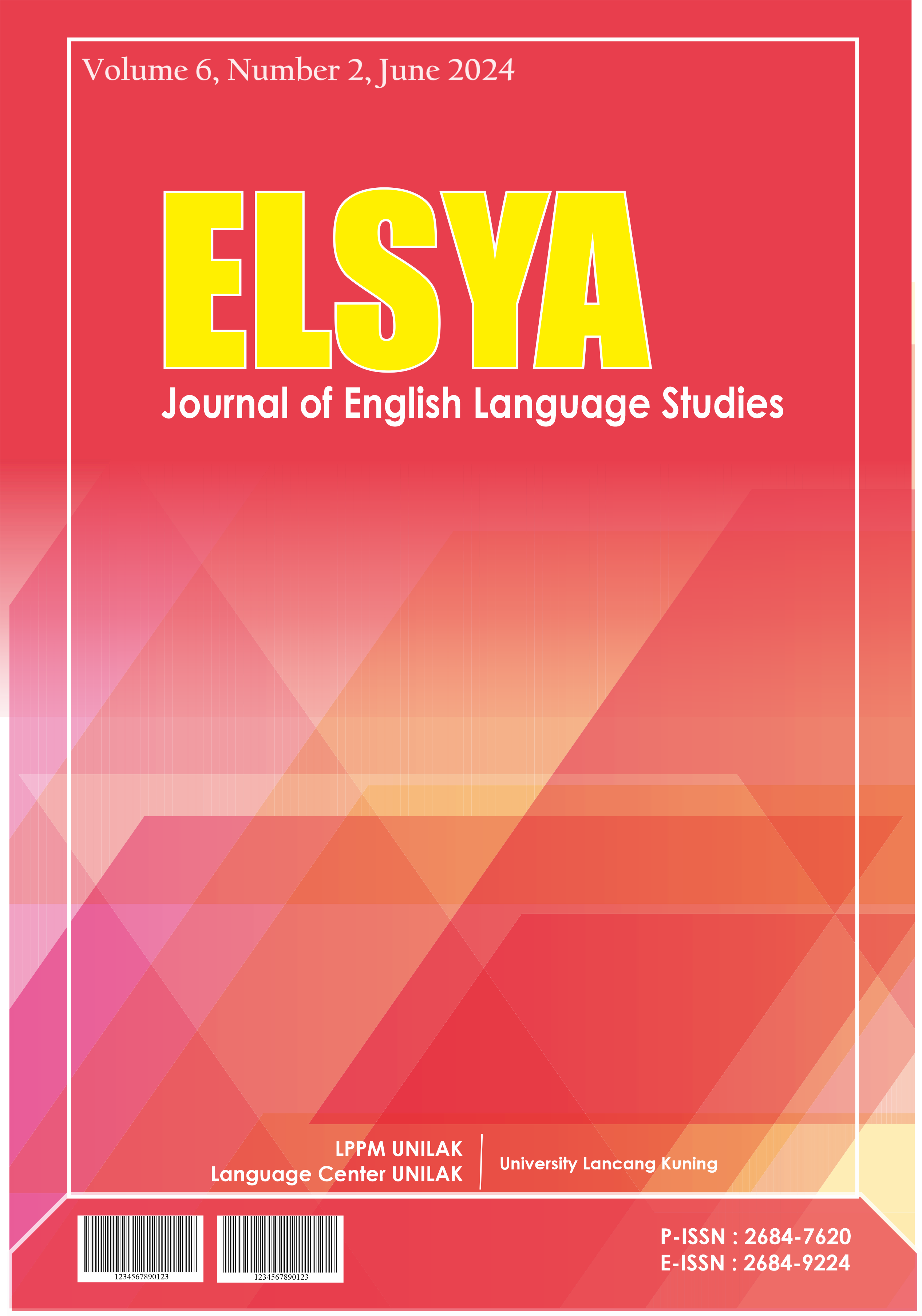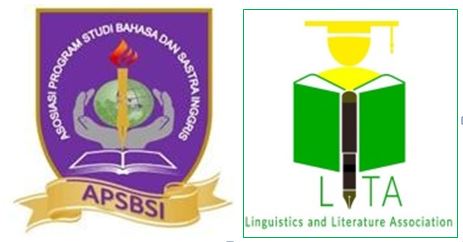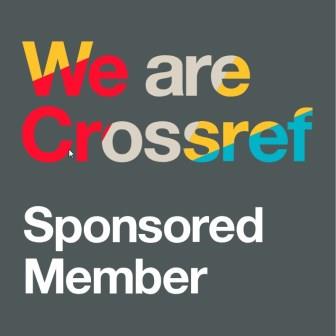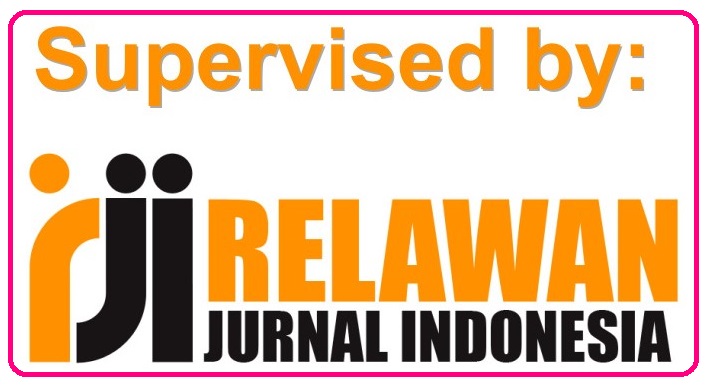The Relationship Between Self-Efficacy and Reflective Practices of Pre-service English Teacher in Indonesian EFL Context
Abstract
Reflective practice has become an issue that has been widely researched, but very few have linked it to pre-service teacher self-efficacy, especially in the Indonesian context. Despite the Ministry of Education’s advocacy for reflective practices as an expected competency, Indonesian teachers have relatively low awareness of the concept and even fewer truly implement the practice. This study is intended to investigate the relationship between EFL pre-service English teachers’ self-efficacy and reflective practices. The quantitative method was chosen since the researchers intended to find out whether there is a significant relationship between pre-service teachers’ self-efficacy and reflective practices with computed by SPSS 23. There are 15 pre-service English teachers of UINSU as the sample and there are 8 items in this study. Researchers used 5 point Likert scale. Simple random sampling was technique to gain the data. The result of data analysis reflected that the null hypothesis (Ho) is rejected. It means that the teachers’ self-efficacy and reflective practices has significant relationship that marked on sig. value is 0.01 is below than 0.05 with level of relationship moderate (0.884). This research contributes to increasing practioners’ awareness of reflective practices and has a significant effect on pre-service English teachers to understand the role of self-efficacy and reflective practice better before teaching English as a Foreign Language (EFL) to their students. The results support that reflective practice can make pre-service English teachers achieve and maintain their professionality English teachers in their career.
Downloads
References
Abidin, Z., Budayasa, I. K., & Khabibah, S. (2021). Reflective practice of pre-Service mathematics teacher on online learning. Journal of Physics: Conference Series, 1. https://doi.org/10.1088/1742-6596/1957/1/012004
Altan, M. Z. (2012). Pre-service EFL teachers’ beliefs about foreign language learning. European Journal of Teacher Education, 35(4), 481–493. https://doi.org/10.1080/02619768.2011.643399
Arsal, Z. (2014). Microteaching and pre-service teachers' sense of self-efficacy in teaching. European Journal of Teacher Education, 37(4), 453–464. http://dx.doi.org/10.1080/02619768.2014.912627
Ary, D., Jacobs, L. C., & Sorensen, C. (2010). Introduction to research in education 8th edition. Wadsworth: Cengage Learning. https://spada.uns.ac.id/pluginfile.php/514264/mod_resource/content/1/Agr.Oth.Lib.12.pdf
Arslan, F. Y. (2019). Reflection in pre-service teacher education: Exploring the nature of four EFL pre-service teachers’ reflections. Reflective Practice, 20(1), 111-124. https://doi.org/10.1080/14623943.2018.1564652
Aydin Gurler, S. (2021). State of prediction of the critical thinking dispositions of primary school teacher candidates through their self-efficacy for STEM practices. Participatory Educational Research, 9(3), 61–81. https://doi.org/10.17275/per.22.54.9.3
Azimi, E., Kuusisto, E., Tirri, K., & Hatami, J. (2019). How do student teachers reflect on their practice through practicum courses? A case study from Iran. Journal of Education for Teaching, 45(3), 277-289. https://doi.org/10.1080/09589236.2019.1599511
Azizah, U.A., Nurkamto, J., Drajati, N. A. (2018). Reflective practice: The experience of pre-service EFL teachers in teaching English. Journal of Language and Linguistic Studies, 14(3), 133-144.
Babaei, M., & Abednia, A. (2016). Reflective teaching and self-efficacy beliefs: Exploring relationships in the context of teaching EFL in Iran. Australian Journal of Teacher Education, 41(9), 1–27. https://doi.org/10.14221/ajte.2016v41n9.1
Bandura, A. (1997). Self-efficacy: An exercise in control. WH Freeman/Times Books/Henry Holt & Co.
Beauchamp, C. (2015). Reflection in teacher education: Issues emerging from a review of current literature. Reflective Practice, 16(1), 123–41. https://doi.org/0.1080/14623943.2014.982525
Benson, P. (2001). Teaching and researching autonomy in language learning. Harlow England. New York: Longman.
Buric, I., & Kim, L. E. (2020). Teacher self-efficacy, instructional quality, and student motivational beliefs: An analysis using multilevel structural equation modeling. Learning and Instruction, 66. https://doi.org/10.1016/j.learninstruc.2019.101302
Çakır, N. K. (2020). The relation between self-efficacy beliefs towards science teaching and learning strategies of primary school teacher candidates. International Journal of Research in Education and Science, 6(2), 347–360. https://doi.org/10.46328/ijres.v6i2.975
Can, S., & Daloglu, A. (2021). University prep school instructors’ self-efficacy perceptions. Journal of Language and Linguistic Studies, 17(1), 493–516. https://doi.org/10.17263/jlls.903485
Cansiz, M., & Cansiz, N. (2019). How do sources of self-efficacy predict pre-service teachers’ beliefs related to constructivist and traditional approaches to teaching and learning? SAGE Open, 9(4). https://doi.org/10.1177/2158244019885125
Cavanagh, M. and Prescott, A. (2010). The growth of reflective practice among three beginning secondary mathematics teachers, Asia-Pacific Journal of Teacher Education, 38(2), 147-591. https://doi.org/10.1080/13598661003678968
Choi, E., & Lee, J. (2018). EFL teachers' self-efficacy and teaching practices. ELT Journal, 72(2), 175–186. https://doi.org/10.1093/elt/ccx046
Cirocki, A., & Widodo, H. P. (2019). Reflective practice in English language teaching in Indonesia: Shared practices from two teacher educators. Iranian Journal of Language Teaching Research, 7(3), 15–35. Retrieved from https://files.eric.ed.gov/fulltext/EJ1230332.pdf.
Clark, S., & Newberry, M. (2019). Are we building preservice Teacher self-efficacy? A large-scale study examining Teacher education experiences. Asia-Pacific Journal of Teacher Education, 47(1), 32–47. https://doi.org/10.1080/1359866X.2018.1497772
Clarke, A. (2006). The nature and substance of cooperating teacher reflection. Teaching and Teacher Education, 22(7), 910–921. https://doi.org/10.1016/j.tate.2006.04.039
Clarke, A, Valerie Triggs, & Nielsen, W. (2014). Cooperating teacher participation in teacher education: A review of the literature. Review of Educational Research, 84(2), 163-202. https://doi.org.10.3102/0034654313499618
Cong, W., & Yu, H. (2020). Research on the strategies of improving classroom teaching quality. 55-58. https://doi.org/10.2991/assehr.k.200801.013
Creswell, J. (2009). Research design: Qualitative, quantitative, and mixed methods approaches. California: SAGE Publications, Inc.
Creswell, J. W. (2010). Research design: qualitative, quantitative, and mixed approaches. Yogyakarta: PT Pustaka Pelajar
Damnet, A. (2021). Enhancing pre-service EFL teachers' teaching skills through teacher training: A case study of a university in Thailand. Advances in Language and Literary Studies, 12(3), 1-11. http://dx.doi.org/10.7575/aiac.alls.v.12n.3.p.1
Darling-Hammond, L. (2014). Strengthening clinical preparation the holy grail of teacher education. Peabody Journal of Education, 89, 547-561.
DeMauro, A. A., & Jennings, P. A. (2016). Pre-service teachers' efficacy beliefs and emotional states. Emotional & Behavioral Difficulties, 21(1), 119–132. https://doi.org/10.1080/13632752.2015.1120057
Demir, S. (2020). The role of self-efficacy in job satisfaction, organizational commitment, motivation, and job involvement. Eurasian Journal of Educational Research, 85, 205 - 224. https://doi.org/10.14689/ejer.2020.85.10
Dolgun, H., & Caner, M. (2018). Self-efficacy belief profiles of pre-service and in-service EFL teachers. Mehmet Akif Ersoy Universitesi Egitim Fakultesi Dergisi, (48), 602-623. https://doi.org/10.21764/maeuefd.335597
Dupuis, J., Savick, S., & Fenster, M. (2020). Relationship between self-efficacy measured by the TSES scale and teacher participation in PDS activity. Professional Educator, 43(1), 47–58.
Eginli, I., & Solhi, M. (2021). The impact of practicum on pre-Service EFL teachers’ self-efficacy beliefs: first step into professionalism. Shanlax International Journal of Education, 9(4), 223–235. https://doi.org/10.34293/education.v9i4.4135
Eyisi, D. (2016). The usefulness of qualitative and quantitative approaches and methods in researching problem-solving abilities in science education curriculum. Journal of Education and Practice, 7, 91-100.
Farrell, T. S. (2015). Reflective language teaching: From research to practice. Bloomsbury Publishing.
Farrell, T. S. (2016). Reflective practice for language teachers. In J. I. Liontas (Ed.), The TESOL Encyclopedia of English language teaching (1st ed.). Hoboken, NJ: John Wiley & Sons.
Fasano, G & Franceschini, A. (1987). A multidimensional version of the Kolmogorov-Smirnov test. Monthly Notices of the Royal Astronomical Society, 225(1), 155–170. https://doi.org/10.1093/mnras/225.1.155
Fidyati, F., Idaryani, I., Suryani, S., Fhonna, R., & Marina, M. (2021). Autonomous EFL learners’ ways of practicing speaking skills during pandemic of covid 19: A Study of Engineering Fresh Graduates, Proceedings of the International Conference on Social Science, Political Science, and Humanities. https://doi.org/10.2991/ASSEHR.K.210125.038
Gale, J., Alemdar, M., Cappelli, C., & Morris, D. (2021). A mixed methods study of self-efficacy, the sources of self-efficacy, and teaching experience. Educational Psychology: Frontiers in Education, 6, 1-16. https://doi.org/10.3389/feduc.2021.750599
Goldag, B. (2020). Investigation of the relationship between high school teachers' self-efficacy perceptions and job satisfaction. Cypriot Journal of Educational Sciences, 15(6), 1464–1479. https://doi.org/10.18844/CJES.V15I6.5285
Griffin, R.W. and Moorhead, G. (2014), Organizational behavior: Managing people and organizations, 11th ed., South-Western Cengage Learning.
Gultom, S., Hutauruk, A. F., & M. Ginting, A. (2020). Teaching skills of teachers in increasing student learning interest. Budapest International Research and Critics Institute (BIRCI-Journal): Humanities and Social Sciences, 3(3), 1564–1569. https://doi.org/10.33258/birci.v3i3.1086
Gungor, M. N. (2016). Turkish Pre-Service teachers’ reflective practices in teaching English to young learners. Australian Journal of Teacher Education, 41(2), 137–51. https://doi.org.10.1177/21582440231210652
Han, J., & Yin, H. (2016). Teacher motivation: Definition, research development and implications for teachers. Cogent Education, 3(1), 45–69. https://doi.org/10.1080/2331186X.2016.1217819
Haraldstad, A., Kristiansen, A. (2020). Building bridges between the pre-Service teachers' school experiences and the teaching of an educational content. A Narrative Approach: Journal of Curriculum Studies.
Hendriwanto. (2021). A reflective teaching practicum as a platform for stimulating pre-service teachers’ professional development. Journal of Education for Teaching, 47(4), 624–626. https://doi.org/10.1080/02607476.2021.1941812
Hien, D. T. (2020). Teacher characteristics: What do EFL pre-service teachers expect. VNU: Journal of Foreign Studies, 35(6). https://doi.org/10.25073/2525-2445/vnufs.4479
Holzberger, D., & Prestele, E. (2021). Teacher self-efficacy and self-reported cognitive activation and classroom management: A multilevel perspective on the role of school characteristics. Learning and Instruction. https://doi.org/10.1016/j.learninstruct.2021.1015 13.
Indahyanti, R. (2016). Indonesian EFL teachers' self-efficacy and their successful teaching performance. English and Literature Journal, 3(2), 173–181.
Jenlink, P. M., & Jenlink, K. E. (2019). Examining educative versus mis-educative experiences in learning to teach. In C. L. Lowery & P. M. Jenlink (Eds.), The handbook of Dewey’s educational theory and practice. Brill:sense. 155–173.
Jerez, O., Orsini, C., Ortiz, C., & Hasbun, B. (2021). Which conditions facilitate the effectiveness of large-group learning activities? A systematic review of research in higher education. Learning: Research and Practice, 7(2), 147- 164. https://doi.org/10.1080/23735082.2020.1871062
Jiang, Y. (2017). A study on professional development of teachers of English as a foreign language in Institutions of higher education in Western China. Berlin: Springer Berlin.
Justel, D. Pena & Zamar. R. (1997). A multivariate Kolmogorov-Smirnov test of goodness of fi. Statistics & Probability Letters, 35(3), 251–259. https://doi.org/10.1016/S0167-7152(97)00020-5.
Khalid, S., & Akhter., M. (2021). Effect of teachers' self-efficacy and instructional strategies on students' engagement at secondary school level. Global Educational Studies Review. https://doi.org/10.31703/gesr.2021(vi-iv).03.
Khezrlou, S., Ellis, R., & Sadeghi, K. (2017). Effects of computer-assisted glosses on EFL learners' vocabulary acquisition and reading comprehension in three learning conditions. System, 65, 104–116. https://doi.org/10.1016/j.system.2017.01.009
Khezrlou, Sima. 2020. The role of task repetition with direct written corrective feedback in L2 writing complexity, accuracy and fluency. Journal of Second Language Studies 3(1). 31–54. https://doi.org/10.1075/jsls.19025.khe.
Kubanyiova, M and Crookes, G (2016) Re envisioning the rol ‐ es, tasks, and contributions of language teachers in the multilingual era of language education research and practice. The Modern Language Journal, 100(1), 117-132. https://doi.org/10.1111/modl.12304
Lailiyah, M., & Cahyono, B. Y. (2017). Indonesian EFL teachers' self-efficacy towards technology integration (SETI) and their use of technology in EFL teaching. Studies in English Language Teaching, 5(2), 344-357.
Lap, T. Q., Lien, N. T. H., & Thao, L. T. (2022). English as a foreign language teachers' perceptions of their self-efficacy in using instructional strategies. European Journal of Educational Research, 11(3), 1865–1875. https://doi.org/10.12973/eu-jer.11.3.1865
Latief, M.A. (2015). Research Methods on Language Learning. Malang: Universitas Negeri Malang.
Lazarides, R., Watt, H., & Richardson, P. (2020). Teachers’ classroom management self-efficacy, perceived classroom management and teaching contexts from beginning until mid-career. Learning and Instruction, 69, 101346. https://doi.org/10.1016/j.learninstruc.2020.1013 46.
Leedy, P. & Ormrod, J. (2001). Practical Research: Planning and Design 7th Edition. Merrill Prentice Hall and SAGE Publications.
Liu, Y., Bellibas, M. Ş., & Gümüş, S. (2021). The effect of instructional leadership and distributed leadership on teacher self-efficacy and job satisfaction: Mediating roles of supportive school culture and teacher collaboration. Educational Management Administration & Leadership, 49(3), 430–453. https://doi.org/10.1177/1741143220910438
Lopes, S. D. F. (2011). Destination image: Origins, Developments and Implications. PASOS. Revista de Turismo y Patrimonio Cultural, 9(2), 305–315. https://doi.org/10.25145/j.pasos.2011.09.027
Lutovac, S., & Assuncao-Flores, M. (2021). ‘Those who fail should not be teachers’: Pre-service Teachers’ Understandings of Failure and Teacher Identity Development. Journal of Education for Teaching, 47(3), 379-394. https://doi.org/10.1080/02607476.2021.1891833
Megawati, F., & Astutik, Y. (2018). Teaching practicum: Investigating EFL pre-service teachers' self-efficacy. English Review: Journal of English Education, 7(1), 125-136. https://doi.org/10.25134/erjee.v7i1.1500
Meng, Q., and Zhang, Q. (2023). The influence of academic self-efficacy on university students' academic performance: the mediating effect of academic engagement. Sustainability, 15(14). https://doi.org/10.3390/su15075767
Moradkhani, S. H., Raygan, A., & Moein, M. S. (2017). Iranian EFL teachers' reflective practices and self-efficacy: Exploring possible relationships. Systems, 65, 1-14. https://doi.org/10.1016/j.system.2016.12.011
Mulyani, S., Nasution, E. S., & Pratiwi, I. W. (2020). The Relationship between Self-Efficacy and Work Engagement of Kindergarten Teachers. Journal of Educational Psychology and Human Resource Development, 9(1), 74–89. https://ejournal.borobudur.ac.id/index.php/psikologi/article/view/724
Nguyen, V. A. (2017). The impact of online learning activities on student learning outcome in blended learning course. Journal of Information and Knowledge Management, 16(4), 1 21. https://doi.org/10.1142/S021964921750 040X
Nugroho, A. S., & Savira, S. I. (2019). The Relationship Between Self-Efficacy and Work Engagement in Certified Teachers at SMPN Nganjuk District. Character: Journal of Psychological Research, 06(2), 1–4.Retrieved from https://ejournal.unesa.ac.id/index.php/character/article/view/27940
Nurkamto, J., & Sarosa, T. (2020). Engaging EFL teachers in reflective practice as a way to pursue sustained professional development. International Journal of Pedagogy and Teacher Education, 4(1), 45-58. https://doi.org/10.20961/ijpte.v4i1.26082
Nurmalia, L., & Setiyaningsih, D. (2020). The Influence of Pedagogical Competence & Motivation on the Self-Efficacy of Teachers at SDN Gugus VI Palmerah, West Jakarta. Holistika Scientific Journal of PGSD, 4(1), 45–52.
Ong, W. A., Swanto, S., & Alsaqqaf, A. (2020). Engaging in reflective practice via vlogs: Experience of Malaysian ESL pre-service teachers. Indonesian Journal of Applied Linguistics, 9, 716-724. https://doi.org/10.17509/ijal.v9i3.23222
Pairi, M., Payangan, O. R., & Hamid, O. N. (2022). The Influence of Teachers' Social Competence and Students' Self-Efficacy on Teacher Performance with Learning Motivation as an Intervening Variable at UPT SMK Negeri 2 Gowa. SEIKO: Journal of Management & Business 5(2):246–58. https://doi.org/10.31289/tabularasa.v2i2.308
Poulou, M. S. (2019). Relation of teacher self-efficacy and classroom practices: A preliminary investigation. School Psychology International, 40(1), 25–48. https://doi.org/10.1177/0143034318798045
Rahimi, M., & Weisi, H. (2018). Reflective practice, self-efficacy and research practice of EFL teachers: Examining possible relationships. Issues in Educational Research, 28(3), 756-780. http://www.iier.org.au/iier28/rahimi.pdf
Rahmat, H., Leng, C. O., & Mashudi, R. (2020). Innovative educational practice for impactful teaching strategies through scaffolding method. Asian Journal of University Education, 16(4). https://doi.org/10.24191/ajue.v16i4.1195
Rao, P. S. (2019). The importance of teaching language skills to second or foreign language learners of English: A comprehensive study. ACADEMICIA: An International Multidisciplinary Research Journal. https://doi.org/10.5958/2249-7137.2019.00061.2
Richards, J. C. (1987). The nature of approaches and methods in language teaching. En Approaches and Methods in Language Teaching. 14-30
Richards, J. C., & Farrell, T. S. (2005). Professional Development for Language Teachers: Strategies for Teacher Learning. Cambridge: Cambridge University Press
Sabgini, K. N. W., & Khoiriyah, K. (2020). The pre-service teachers' reflection in English for young learners teaching practice. English Review: Journal of English Education, 8(2), 311- 322. http://doi.org/10.25134/erjee.v8i2.3028
Saepuloh, A., & Salsabila, V. (2022). Virtual reality in teaching English vocabulary about things around. Journal of Empowerment. https://doi.org/10.35194/je.v3i1.2387.
Sa’pang, A. W., & Purbojo, R. (2020). Teacher Self-Efficacy, Understanding of Student Character, and Understanding of 21st Century Skills as Predictors of Facilitator Type Teaching Style. Journal of Ulayat Psychology, 7(2), 192–211. https://doi.org/10.24854/jpu108
Smolarek, B. B., & Hora, M. T. (2016). Examining how faculty reflect on instructional data: A call for critical awareness and institutional support. WCER Working Paper, 4. http://www.wcer.wisc.edu/publications/workingpapers/
Sartana, F., Entang, M., Patras, Y. E., & Harijanto, S. (2020). Improving Teacher Work Creativity by Improving Organizational Culture and Self-Efficacy. Journal of Educational Management, 8(1), 41–45. https://doi.org/10.33751/jmp.v8i1.1964
Sarwono, J. (2012). Thesis research methods, quantitative approach. PT. Elex Media Komputindo: Jakarta.
Saputra, D. B., Suherdi, D., & Rodliyah, R. S. (2020). Reflective practice as a tool to explore in-service teachers' beliefs and classroom practices: Indonesian EFL teachers' voices. Journal of Applied Linguistics and Literature, 8, (2), 174-192. http://dx.doi.org/10.33369/joall.v5i2.11260
Sheng, J. (2022). Research on college English vocabulary teaching combined with poa and word formation teaching. Frontiers in Educational Research. https://doi.org/10.25236/fer.2022.051009
Starinne, A., & Kurniawati, D. (2019). Self-efficacy of pre-service English teachers in using English as a language instruction. Journal of English Teaching, Literature, and Applied Linguistics, 3(1), 13-23. https://doi.org//10.30587/jetlal.v3il.786
Sudrajat, A., Setiyaningsih, S., & Sarimanah, E. (2020). Improving Teacher Creativity Through Servant Leadership Development and Self-Efficacy of Permanent Foundation Teachers. Journal of Educational Management, 8(2), 70–73. https://doi.org/10.33751/jmp.v8i2.2756
Sunardi, S., Sunaryo, W., & Laihad, G. H. (2019). Increasing Innovativeness Through Transformational Leadership Development and Self-Efficacy. Journal of Educational Management, 7(1), 740–747. https://doi.org/10.33751/jmp.v7i1.959
Szabo, E., Korodi, K., Szel, E., & Jagodics, B. (2021). Facing the inevitable: The Effects of coronavirus disease pandemic and online teaching on teachers’ self-efficacy, workload and job satisfaction. European Journal of Educational Research, 11(1), 151–162. https://doi.org.10.12973/eu-jer.11.1.151
Tanjung, R., Arifudin, O., Sofyan, Y., & Hendar. (2020). The Influence of Self-Assessment and Self-Efficacy on Job Satisfaction and Its Implications on Teacher Performance. JIMEA: Scientific Journal of MEA (Management, Economics, and Accounting), 4(1), 380–391. https://doi.org/10.31955/mea.v4i1.554
Tanurezal, N., & Tumanggor, R. O. (2020). The Relationship Between Self-Efficacy and Work Engagement in Classroom Teachers at Inclusive Schools in Jakarta. Journal of Social Sciences, Humanities, and Arts, 4(2), 393. https://doi.org/10.24912/jmishumsen.v4i2.8635.2020
Tezera, D., & Bekele, G. (2021). Effect of teachers' self-efficacy on their attitude towards the implementation of Multicultural Education literacy in Harari Government Secondary Schools. International Journal of Education and Literacy Studies, 9(1), 172. https://doi.org/10.7575/aiac.ijels.v.9n.1p.172
The Ministry of National Education of Republic Indonesia. (2007). Competence standard of subject matter teachers at elementary school. Retrieved 23 May, 2022 from https://sma.kemdikbud.go.id
Tschannen-Moran, M., & Hoy, A. W. (2001). Teacher efficacy: Capturing an elusive construct. Teaching and Teacher Education, 17(7), 783–805. https://doi.org/10.1016/S0742-051X(01)00036-1
Turker, Y., & Kahraman, U. (2021). School climate and self-efficacy as predictor of job satisfaction. Journal of Theoritical Educational Science. 14(4), 548–569. https://doi.org/10.30831/akukeg.901457
Van Rooij, E. C. M., Fokkens-Bruinsma, M., & Goedhart, M. (2019). Preparing science undergraduates for a teaching career: Sources of their teacher self-efficacy. Teacher Educator, 54(3), 270–294. https://doi.org/10.1080/08878730.2019.1606374
Wati, R., Hidayat, N., & Muharam, H. (2022). Improving School Effectiveness Through Developing Teacher Self-Efficacy and School Climate. Journal of Educational Management, 10(1), 016–023. https://doi.org/10.33751/jmp.v10i1.5060
Widodo, H. P., & Ferdiansyah, S. (2020). Engaging student teachers in video-mediated self-reflection in teaching practice. In Routledge International Handbook of Schools and Schooling in Asia. https://doi.org/10.4324/9781315694382-89
Yanuarti, E., & Treagust, D. F. (2016). Reflective teaching practice (teachers' perspectives in an Indonesian context). 1st UPI International Conference on Sociology Education. Atlantis Press.
Yu, Y. (2019). The research on cooperative learning in English reading teaching in college. Theory and Practice in Language Studies. https://doi.org/10.17507/TPLS.0906.10
Zembylas, M. (2003). Caring for teacher emotion: Reflections on teacher self-development. Studies in Philosophy & Education, 22, 103-125. https://doi.org/10.1023/A:1022293304065
Zonoubi, R., Rasekh, A. E., Tavakoli, M. (2017). EFL teachers self-efficacy development in professional learning communities. System, 66, 1-12. https://doi.org/10.1016/j.system.2017.03.003
Zulfikar, T., & Mujiburrahman. (2018). Understanding own teaching: Becoming reflective teacher through reflective journals. Reflective Practice, 19(1), 1-13. https://doi.org/10.1080/14623943.2017.1295933
- Author retains the copyright and grants Elsya Journal the right of first publication of the work simultaneously licensed under the Creative Commons Attribution-ShareAlike 4.0 License that allows others to share the work with an acknowledgment of the work's authorship and initial publication in this journal
- The author is able to enter into separate, additional contractual arrangements for the non-exclusive distribution of the journal's published version of the work (e.g., post it to an institutional repository or publish it in a book) with the acknowledgment of its initial publication in this journal.
- The author is permitted and encouraged to post his/her work online (e.g., in institutional repositories or on their website) prior to and during the submission process, as it can lead to productive exchanges, as well as earlier and greater citation of the published work (See The Effect of Open Access).








 Elsya Journal is licensed under
Elsya Journal is licensed under 